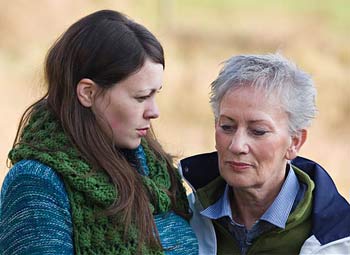 Emotional health is as important to quality of life as physical health. Sometimes even more so. A strong sense of self and a clear sense of purpose can go a long way toward making even the most difficult situation a rich personal experience. And if the challenges of life get us down, prolonged sadness—depression— is not just a normal hazard of aging that needs to be endured. It’s a bona fide medical condition with biological roots. Fortunately, there are many ways to successfully address and treat depression.
Emotional health is as important to quality of life as physical health. Sometimes even more so. A strong sense of self and a clear sense of purpose can go a long way toward making even the most difficult situation a rich personal experience. And if the challenges of life get us down, prolonged sadness—depression— is not just a normal hazard of aging that needs to be endured. It’s a bona fide medical condition with biological roots. Fortunately, there are many ways to successfully address and treat depression.
Emotional changes
Sense of self
 Our sense of self changes as we age and is greatly impacted by our feelings about getting older.
Our sense of self changes as we age and is greatly impacted by our feelings about getting older.
Over the years, there is, of course, an undeniable physical decline. Anxiety can run high as we struggle with the pain or discomfort of disability. Or even just the prospect of disability.
Stigma of aging
Fear can also turn to shame and self-doubt as we confront a culture that emphasizes independence so heavily.
The emotional challenge
Who we are is much more than our physical abilities and medical conditions.
The emotional challenge of the later years is to separate our sense of self-worth from our physical abilities.
Coming to terms with aging is about creating our unique social and emotional definition of self.
Consider these thoughts as you seek to define what aging means to you and who you want to be as you continue to get older.
Return to topWhat does aging mean to you?
“Who is that old person in the mirror? Inside I feel like I’m still 30.”
Who we are inside is actually the accumulation of all our experiences, whether we are 20 or 80. The older we are, the more experiences we have to draw from in our personal portfolio. We are our 30-year old self, as well as all the other ages we’ve been.
When we are surprised by the image in the mirror, it is because our experience of being older doesn’t match what we thought we would feel when we had wrinkles or grey hair. Our picture of aging was way too limited.
It’s time to throw off the pre-conceptions. Part of accepting our aging selves is to be curious and open to exploring who we might become on this journey. Not in terms of any super-achiever age-defying feats. But more looking at the inner world and the continuing growth of our insights and understanding.
 Return to top
Return to top
We never stop growing
 Ask a 90-year-old if 60 year olds seem wet behind the ears and they will probably laugh. And if they are honest, they will say “yes.”
Ask a 90-year-old if 60 year olds seem wet behind the ears and they will probably laugh. And if they are honest, they will say “yes.”
We don’t stop absorbing and learning just because we hit a certain age.
Milestones in aging
No one disagrees that there are developmental tasks or milestones at the forefront in our earlier years.
The same holds true in the natural cycle of life as we confront the issues of our later years.
Opportunities for growth
How we address those issues will be a big part of our emotional experience of aging.
There are many growth opportunities in our later chapters, but here are a few that rise to the top:
- Separating abilities from self-worth
In a culture that values independence and self-sufficiency, it can be difficult to acknowledge declining abilities. Aside from the practical inconvenience, there are symbolic meanings attached. Part of the aging process involves learning to separate our self-worth from our ability to produce and get things done. Even, ultimately, from our ability to attend to our basic needs. We are human beings not human doings. Nevertheless, it’s challenging to confront the feelings of anxiety and low self-esteem that arise when nature is simply taking its course.
- Controlling what you can
In middle age, the world is our oyster. We get used to feelings of power or “agency.” We are confident in knowing what we can get done as we navigate career, family and community. Challenges typically involve time more than ability. We are outward focused and it’s easy to live under the illusion that we have control. As older adults, however, things shift. We ultimately realize that nature bats last. Try as we might, our bodies have their own agenda. Friends move. Spouses die. In order not to feel so powerless, we strive to control what we can. Getting to choose, no matter the size of the decision, becomes vitally important. It is critical that families and professionals respect this need. - Letting go as needed
Vital as it is to feel in control, we have fewer bumps and bruises if we also learn how to graciously let go of control as the situation warrants. It requires trust. And great courage. It requires finding new ways to express ourselves and discovering deeper sources of personal dignity. Learning to release control is one of the parts about aging that makes it “not for sissies.”
- Finding meaning or purpose
One of the advantages of decreased abilities is that it encourages us to turn inward. We reflect on our lives. This is the gift of our later years. We have the opportunity, yet, to focus on what’s truly important to us and to live those priorities. Whether it’s cultivating relationships, volunteering in the community, or spending time in the garden. This inner journey is more than your bucket list. And more rewarding. By concentrating on meaning and purpose, we create a new sense of self as we continuing the question of “Who am I now?”
If you feel depressed
 Depression in older adults is very common. More than 2 million older Americans suffer from depression. Unfortunately, depression is under-diagnosed in older adults by about 50%.
Depression in older adults is very common. More than 2 million older Americans suffer from depression. Unfortunately, depression is under-diagnosed in older adults by about 50%.
Not a “normal part of aging”
Too many people think depression is “normal” when you get to a certain age. Not so!
Depression is a very real, and thankfully very treatable biological condition. If you are depressed, rest assured that you don’t have settle for being sad.
Signs of depression
Depression is more than a passing mood. Depression is actually a biochemical imbalance in the brain. It’s not something you can just “snap out of.” It requires treatment.
If a person experiences four or more of these symptoms every day, for most of the day, over a two-week period, medical professionals would call it “major depression”:
- Feelings of sadness, which may or may not include crying spells
- Loss of interest or pleasure in normal activities
- Changes in appetite leading to a 5% weight loss or weight gain
- Slowed speech, slowed reactions, slowed movements
- Changes in sleep habits
- Confused or distracted thinking
- Fatigue
- Feelings of worthlessness or guilt
- Frequent thoughts of death, dying, or suicide
A big reason depression goes unrecognized is that many of the symptoms seem common in older adults. Fatigue, for example, or reduced appetite may be wrongly considered “normal” side effects of age. Or they may be a side effect from a medical condition or treatment.
To zero in on depression for older adults, only two simple questions are needed:
In the past two weeks, how often have you
- felt down, depressed, or hopeless?
- found yourself with no interest or pleasure in doing things that you used to like?
If the answer is “more than half the time” for both, or “every day” for just one, then doctor should be consulted.
(Depression is also very common in family caregivers, so if any of this rings a bell for you as a family member, by all means talk to your doctor!)
Treatment for depression
Studies show that 60% to 80% of older adults who receive appropriate treatment for depression do feel better.
Medication
Antidepressant medication is the most common approach. Things to know about antidepressants:
- Your primary care doctor can write the prescription.
- Costs are typically covered by insurance.
- Today’s antidepressants have fewer side effects than in years past.
- It may take 4 to 6 weeks before you feel the full effect.
- You may need to try a few different medications before finding the one that works best.
Mental health counseling
This is often the preferred treatment. Many doctors prescribe counseling along with antidepressants. Most counseling involves private sessions with a specially trained professional.
- Sessions may focus on solving problems in daily life. Or they may concentrate on resolving difficult relationships.
- You may learn strategies for more positive ways of thinking. Or how actions and activities affect mood.
Other options
Research studies reveal two proven self-help options. They are useful if the depression is not severe.
- Exercise. Regular exercise boosts mental as well as physical health. Get the doctor’s approval before you start a new exercise program.
- Reading self-help books. Completing written exercises in books about depression can change thought patterns and behaviors. Ask the doctor to recommend a book he or she has found to be effective.
Work with a professional
No matter the treatment chosen, make sure a trained professional stays involved. Ongoing monitoring is essential.



